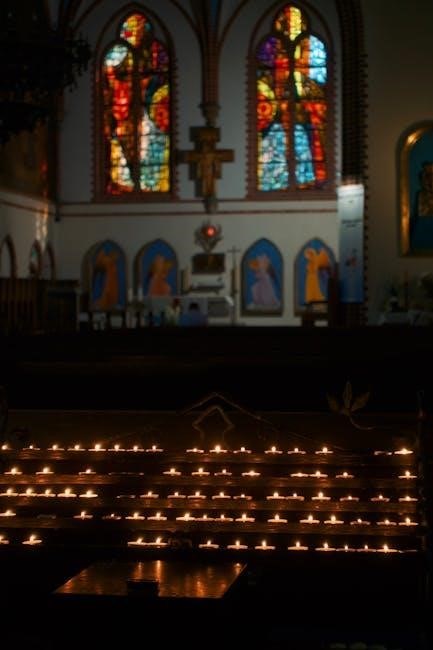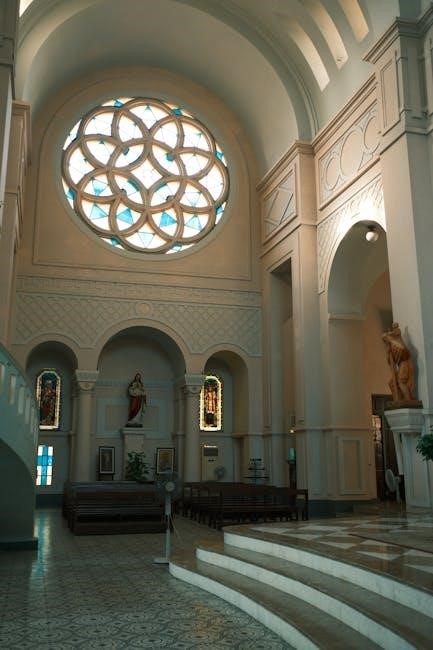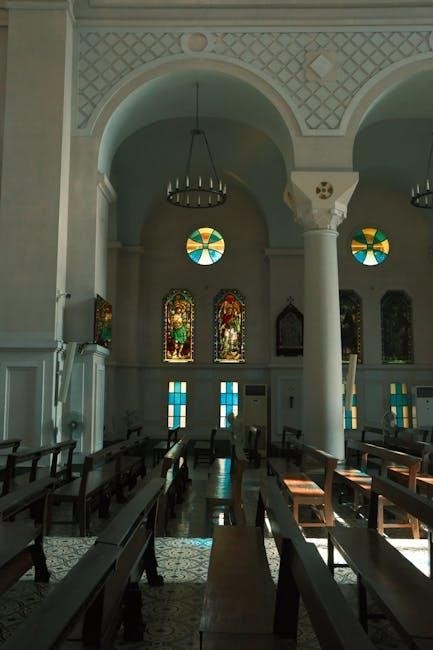Thomas Merton’s prayer life reflects his deep contemplative spirit, emphasizing faith, surrender, and inner reflection․ His prayers, available in PDF formats like “A Prayer of Trust,” showcase his monastic influences and spiritual journey, offering timeless guidance for personal devotion and meditation․

1․1․ Overview of Thomas Merton and His Spiritual Legacy
Thomas Merton, a Trappist monk and renowned spiritual writer, left an indelible mark on Christian spirituality․ Born in 1915 and passing in 1968, Merton’s life was a journey of contemplation, social justice, and interfaith dialogue․ His writings, such as The Seven Storey Mountain, resonated globally, offering insights into prayer, solitude, and the human condition․ Merton’s legacy is rooted in his ability to blend monastic tradition with modern relevance, making him a timeless guide for seekers of spiritual truth․ His prayers, like “A Prayer of Trust,” reflect his deep faith and surrender to God’s will․

1․2․ The Significance of Prayer in Merton’s Writings
Prayer holds a central place in Thomas Merton’s writings, serving as both a personal spiritual practice and a universal pathway to divine connection․ Merton often emphasized prayer as a means of surrendering to God’s will, fostering inner transformation, and cultivating a deeper understanding of oneself and the world․ His prayers, such as those found in his Book of Hours, are infused with contemplative reflection, humility, and trust in God’s providence․ Through his writings, Merton invites readers to embrace prayer as a journey of faith, guiding them toward a more authentic and meaningful spiritual life․
1․3․ Popular Prayers by Thomas Merton Available in PDF Format
Thomas Merton’s prayers are widely accessible in PDF formats, offering readers a convenient way to engage with his spiritual legacy․ One of his most celebrated prayers, “A Prayer of Trust,” is frequently shared in digital formats, reflecting themes of surrender and faith․ Additionally, prayers from his Book of Hours and excerpts from The Asian Journal are popular among those seeking contemplative inspiration․ These PDF resources provide a tangible connection to Merton’s profound reflections, making his spiritual wisdom easily accessible for personal devotion and meditation in the modern era․

The Prayer of Thomas Merton: Key Themes and Elements
Thomas Merton’s prayers emphasize contemplative prayer, faith, and surrender, encouraging inner reflection and a deep connection with the divine, while embracing the mystery of God’s will․

2․1․ The Concept of Contemplative Prayer
Thomas Merton’s concept of contemplative prayer emphasizes silent, inner reflection aimed at connecting with God beyond words․ Rooted in monastic traditions, it seeks a deeper union with the divine, fostering humility and surrender․ Merton viewed contemplation as a gift, not a method, where one rests in God’s presence, embracing mystery and unknowing․ This practice, central to his spirituality, encourages letting go of self-will and trusting in divine providence, transforming prayer into a lived experience of faith and love․ Merton’s writings, like those in his Asian Journal and Book of Hours, illustrate this transformative prayer form․
2․2․ Merton’s Approach to Inner Reflection and Meditation
Thomas Merton’s approach to inner reflection and meditation centered on simplicity, silence, and surrender․ He emphasized the importance of stillness to encounter God’s presence, often drawing from monastic traditions․ Merton advocated for mindfulness, encouraging individuals to let go of distractions and focus on being present with God․ His writings, such as those in the Asian Journal, highlight the value of solitude in fostering deep inner awareness․ This practice, rooted in trust and humility, allowed Merton to cultivate a prayer life that transcended words, seeking union with the divine in the depths of the soul․
2․3․ The Role of Faith and Surrender in Merton’s Prayers
Thomas Merton’s prayers profoundly emphasize the role of faith and surrender․ He believed that true prayer begins with acknowledging one’s limitations and trusting in God’s will․ Merton often expressed that faith is not about understanding but about surrendering to the unknown․ In his “Prayer of Trust,” he writes about relinquishing control and embracing God’s guidance․ For Merton, surrender was not a loss of self but a liberation, allowing one to align with divine love․ His prayers inspire believers to let go of ego and distractions, fostering a deeper reliance on God’s providence and grace․

Historical Context of Merton’s Prayers
Thomas Merton’s prayers were shaped by his monastic life at the Abbey of Gethsemani and influenced by his Asian Journal, reflecting his evolving spiritual journey and introspection․
3․1․ The Influence of Merton’s Monastic Life on His Prayers
Thomas Merton’s monastic life at the Abbey of Gethsemani profoundly shaped his prayer life, emphasizing contemplation and inner reflection․ The structured rhythms of monasticism, including daily prayer and meditation, influenced his focus on surrender and faith․ His vows of poverty and obedience likely inspired prayers seeking guidance in aligning with God’s will․ The communal and silent aspects of monastic life fostered a deep, introspective prayer practice, reflecting themes of trust and divine presence․ Merton’s monastic environment thus became a sanctuary for spiritual growth, deeply embedding prayer into his daily life and writings․

3․2․ The Asian Journal and Its Impact on Merton’s Spiritual Thoughts
Thomas Merton’s Asian Journal, documenting his 1968 trip to Asia, deeply influenced his spiritual thoughts, particularly in prayer․ Encounters with Eastern mysticism expanded his views on contemplation, integrating elements of Buddhist meditation․ The journal reveals a heightened sense of interconnectedness and universality in prayer, reflecting his evolving understanding of the divine․ Merton’s experiences in Asia enriched his prayer life, emphasizing silence and inner unity․ This period marked a significant shift, blending Christian and Eastern spiritual practices, which he expressed in his writings, offering a broader, inclusive perspective on prayer and spirituality․
3․3․ The Evolution of Merton’s Prayer Life Over Time
Thomas Merton’s prayer life underwent significant evolution, reflecting his spiritual growth․ Early years as a monk emphasized liturgical and structured prayer, while later years embraced contemplative silence․ His Asian Journal period revealed integration of Eastern meditation, deepening his inner reflection․ Merton’s prayers became more personal and spontaneous, focusing on surrender and trust․ This transformation is evident in his writings, such as “A Prayer of Trust,” showcasing his journey from formal devotion to a profound, intimate dialogue with God․ His evolving prayer life remains a testament to his dynamic spiritual journey and universal appeal․
Specific Prayers and Their Meanings
Thomas Merton’s prayers, such as “A Prayer of Trust,” reflect themes of surrender, faith, and inner reflection․ Available in PDF, they offer profound spiritual guidance and personal inspiration․
4․1․ “A Prayer of Trust” by Thomas Merton
Thomas Merton’s “A Prayer of Trust” embodies his deep faith and surrender to God’s will․ Expressing uncertainty about life’s path, Merton humbly acknowledges his limitations while trusting in divine guidance․ The prayer, widely available in PDF formats, reflects his contemplative spirit and emphasis on inner reflection․ It resonates with themes of self-awareness, humility, and reliance on God, making it a powerful tool for personal devotion and meditation․ Merton’s words invite readers to embrace the unknown with faith, aligning their desires with God’s love and purpose․
4․2․ Prayers from Merton’s Book of Hours
Thomas Merton’s Book of Hours offers a collection of prayers that blend monastic tradition with personal devotion․ These prayers, available in PDF formats, reflect Merton’s journey into contemplative spirituality, emphasizing mindfulness and surrender․ They are structured around daily offices, guiding followers through moments of reflection and praise․ The prayers showcase Merton’s ability to merge liturgical rhythms with profound introspection, making them accessible for both communal and individual worship․ Their timeless wisdom continues to inspire seekers of spiritual depth, offering a bridge between ancient monastic practices and modern spiritual needs․
4․3․ The Prayer of Mary in Merton’s Writings
Thomas Merton’s writings occasionally reflect on the prayer of Mary, emphasizing her role as a symbol of divine union and purity․ In his Asian Journal, Merton contemplated a prayer that might be attributed to Mary, highlighting her mystical union with God․ This prayer underscores themes of holiness and surrender, reflecting Merton’s reverence for her spiritual gifts․ His portrayal of Mary aligns with Catholic tradition, yet infuses a contemplative depth․ These reflections are available in PDF formats, offering readers a glimpse into Merton’s Marian spirituality and its connection to his broader theological insights․

Theological and Philosophical Insights
Thomas Merton’s prayers reveal a theology of unknowing, emphasizing faith and surrender, while highlighting the Holy Spirit’s role in guiding prayer and fostering a deeper union with God․
5․1․ The Theology of Unknowing in Merton’s Prayers

Merton’s theology of unknowing, central to his prayers, emphasizes the limitations of human understanding in divine matters․ He advocates for surrendering to God’s will, trusting in faith rather than knowledge․ This concept, rooted in contemplative traditions, encourages believers to embrace mystery and humility․ Merton’s “Prayer of Trust” exemplifies this, expressing uncertainty about life’s path while affirming reliance on God’s guidance․ His writings invite seekers to move beyond rational comprehension, finding solace in divine presence and love․ This approach remains a cornerstone of his spiritual legacy, resonating deeply with modern seekers of truth․
5․2․ The Role of the Holy Spirit in Merton’s Prayer Life
The Holy Spirit plays a pivotal role in Merton’s prayer life, serving as a divine guide and source of inspiration․ Merton often invoked the Spirit to illuminate his path and deepen his connection with God․ In his “Prayer of Trust,” he expresses reliance on the Spirit’s wisdom, acknowledging its presence in moments of uncertainty․ Merton believed the Holy Spirit fosters inner transformation and unity with God, enabling believers to embrace contemplative prayer and live a life of surrender․ This emphasis on the Spirit reflects Merton’s belief in divine assistance as essential for authentic spiritual growth and intimacy with God․
5․3․ Merton’s Views on the Nature of God and Humanity
Merton’s prayers reveal his profound understanding of God as a loving, mysterious Presence․ He often emphasized the divine spark within humanity, believing that God resides in the depths of the soul․ Merton saw humans as both flawed and capable of union with God through prayer and surrender․ His writings highlight the paradox of human weakness and divine potential, urging believers to embrace their true nature as children of God․ This perspective is central to his theology, offering a hopeful vision of humanity’s relationship with the divine․
Practical Applications of Merton’s Prayers
Merton’s prayers offer practical guidance for daily spiritual growth through reflection, meditation, and surrender, fostering a deeper connection with God in everyday life․
6․1․ Using Merton’s Prayers for Personal Reflection
Thomas Merton’s prayers provide profound tools for personal reflection, inviting individuals to explore their inner lives and deepen their relationship with God․ His works, such as “A Prayer of Trust,” encourage surrender and faith, offering guidance for navigating life’s uncertainties․ The simplicity and depth of his language make his prayers accessible for meditation and journaling․ By incorporating Merton’s prayers into daily routines, individuals can cultivate mindfulness, self-awareness, and a greater sense of purpose․ His reflections remain timeless, continuing to inspire seekers of spiritual growth and introspection in their personal journeys․
6․2․ Incorporating Merton’s Prayers into Daily Devotions
Thomas Merton’s prayers, such as “A Prayer of Trust” and those from his Book of Hours, offer a meaningful way to enrich daily devotions․ Their reflective and contemplative nature makes them ideal for morning or evening prayer routines․ Reading Merton’s prayers in PDF format can serve as a spiritual anchor, helping individuals focus on God’s presence․ His words inspire gratitude, humility, and surrender, fostering a deeper connection with the divine․ By integrating these prayers into daily life, one can cultivate a sense of peace and alignment with God’s will, making them a valuable addition to personal worship practices․
6․3․ The Role of Silence and Solitude in Merton’s Prayer Practice
Thomas Merton’s prayer life was deeply rooted in silence and solitude, which he believed were essential for genuine spiritual connection․ As a Trappist monk, he embraced the monastic tradition of quiet contemplation, viewing it as a means to encounter God’s presence․ In his prayers, such as those found in PDF formats like “A Prayer of Trust,” Merton often emphasized the importance of stillness to discern God’s will․ Silence, for Merton, was not the absence of noise but the presence of God․ This practice remains a powerful inspiration for modern Christians seeking to deepen their prayer lives through solitude and introspection․
Merton’s Influence on Modern Christian Spirituality
Thomas Merton’s prayers have profoundly shaped modern Christian spirituality by emphasizing contemplative practices, fostering authenticity, and deepening personal faith, inspiring countless believers to embrace a more reflective prayer life․
7․1․ How Merton’s Prayers Have Shaped Contemporary Prayer Practices
Thomas Merton’s prayers have significantly influenced contemporary prayer practices by emphasizing contemplative prayer and inner reflection․ His writings encourage believers to embrace silence and solitude, fostering a deeper connection with God․ Merton’s approach to prayer, rooted in monastic traditions, has inspired many to integrate mindfulness and meditation into their spiritual routines․ His emphasis on surrender and trust in God’s will has reshaped how modern Christians view prayer as a transformative and intimate dialogue with the divine․ Merton’s legacy continues to guide individuals in cultivating a more authentic and meaningful prayer life, blending tradition with modern spirituality․
7․2․ The Impact of Merton’s Writings on Christian Mysticism
Thomas Merton’s writings have profoundly influenced Christian mysticism by bridging traditional monastic spirituality with contemporary seekers․ His exploration of contemplative prayer and the “theology of unknowing” has resonated deeply, encouraging believers to embrace mystery and intimacy with God․ Merton’s emphasis on inner transformation and union with the divine has revitalized interest in mystical practices, offering a pathway for modern Christians to experience God beyond doctrine․ His work continues to inspire a renewed focus on personal spiritual journeys, making him a pivotal figure in the evolution of Christian mysticism for today’s seekers and scholars alike․
7․3․ Merton’s Legacy in the Context of Interfaith Dialogue
Thomas Merton’s legacy extends beyond Christianity, contributing significantly to interfaith dialogue․ His exploration of universal spiritual truths and transcendental experiences resonates across religious traditions․ Merton’s writings, particularly in his Asian Journal, reveal a deep appreciation for Eastern spirituality, including Zen and Tibetan Buddhism․ This openness has inspired interfaith conversations, fostering mutual respect and understanding․ His emphasis on prayer as a shared human experience bridges divides, encouraging people of all faiths to seek unity in their spiritual journeys; Merton’s work remains a cornerstone for those exploring the common ground between different religious paths and the universal quest for the divine․

Thomas Merton’s prayers remain a profound source of spiritual guidance, offering timeless wisdom and solace for those seeking deeper faith and inner peace in contemporary life․
8․1․ Summary of Key Points
Thomas Merton’s prayer life embodies a profound journey of faith, contemplation, and surrender․ His prayers, such as “A Prayer of Trust,” reflect his deep reliance on God’s will and grace․ Merton’s monastic experience and spiritual writings emphasize the importance of inner reflection, meditation, and the pursuit of a closer relationship with the divine․ His work highlights the transformative power of prayer, offering practical guidance for personal devotion and spiritual growth․ Merton’s legacy continues to inspire modern Christian spirituality, fostering a deeper understanding of God’s presence in everyday life․
8․2; Final Thoughts on the Relevance of Merton’s Prayers Today
Thomas Merton’s prayers remain profoundly relevant today, offering guidance for spiritual seekers in a chaotic world․ His emphasis on contemplation, trust, and inner reflection resonates across diverse faith traditions․ Merton’s ability to articulate universal human struggles and hopes ensures his prayers continue to inspire․ The accessibility of his prayers in formats like PDF has widened their reach, making them a valuable resource for modern devotion․ Merton’s legacy reminds us that prayer is not just a practice but a way of life, fostering intimacy with God and transforming our understanding of ourselves and the world․

Leave a Reply
You must be logged in to post a comment.